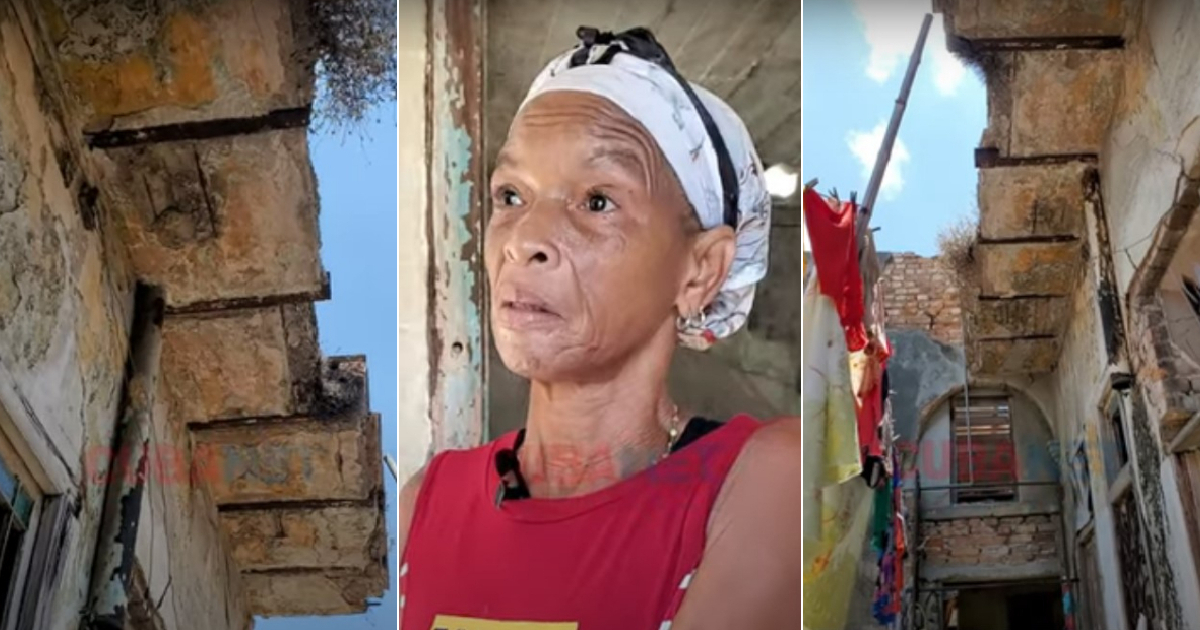Aracelia González Díaz, a Cuban mother, lives with the constant fear of losing her family if the house they reside in completely collapses in the Cerro municipality of Havana. In an interview with CubaNet, González highlighted—and showed on camera—the dire conditions of her home located on Churruca Street, between Daoiz and Velarde, which has already suffered two partial collapses and could come down at any moment.
"I'm scared to go to work one day and have this collapse with my mother inside," confessed González, who has repeatedly sought help from government agencies to address or remedy the issue, only to be met with indifference, disinterest, and inaction from the authorities.
Living with González in the precarious structure are her nearly 90-year-old mother, who suffers from blindness, diabetes, and high blood pressure, and her two-year-old grandson, who stays with them most of the time because his mother's house is also at risk of collapsing.
According to González, when the government handed the house to her grandmother, it was already uninhabitable. "They later promised us a shelter, but never followed through. It seems we have to build on our own, and I don't have the money for that," she stated.
González, who works as a kitchen assistant and earns a salary of 2,500 pesos, explained that she requested a subsidy from the authorities to prevent the house from completely falling apart, but to no avail. "They told us no because the property is still under my grandmother's name," she noted.
She recounted to CubaNet how the roof of her room collapsed first, despite having alerted the Cerro Municipal Housing Directorate. "The roof was already in bad shape; I went to Housing to ask them to tear it down, but they never came until it collapsed. On top of that, I had to report it for them to come and remove the remaining part; they came, tore it down, and left," she detailed.
The second collapse occurred earlier this year: the roof of the second room fell due to heavy rains that hit Havana. However, she reported that, to date, the authorities have shown no concern about what happened. Despite the increasing danger to their lives, "the Housing official came, looked, wrote something on a piece of paper, and that was it," she revealed.
González reiterated a problem faced by a significant portion of the population in the Cuban capital, plagued by the precariousness of the housing stock: the lack of action and negligence by the authorities. "They start giving you the runaround; there's never any materials or anything for those in need. Yet, you go to the Rastro (black market), and there are piles of stone, sand, and rebar. Then you see how everything is resold outside," she complained.
"My biggest fear is losing my family if a collapse occurs. I have no one to help me, neither from here nor from there nor from anywhere. It's just me, and everything is expensive, even to eat," González expressed.
"I wish I could improve my life; I wish for everything because I have a family, I have children, I have grandchildren, but I can't, I have nothing...," lamented the Cuban mother. "Where am I going to get the thousands to lay a slab, to live like people? I don't have that, I can't afford it."
The anxiety of Aracelia González Díaz is shared by hundreds of thousands of Cubans living in homes at risk of collapse, which, if it happens, could cost them their lives, as it has in numerous cases. Recently, the collapse of a house facade in Guanabacoa resulted in the death of a man. Since June, numerous collapses have been reported in Havana and other provinces, resulting in deaths and injuries, as well as leaving people homeless after losing their homes and belongings.
Living Conditions and Housing Crisis in Havana
The following questions and answers provide further insights into the living conditions and housing crisis faced by many residents in Havana.
What are the main challenges faced by residents in precarious housing in Havana?
Residents face constant fear of structural collapses, lack of government action, and insufficient financial resources to make necessary repairs.
How has the government responded to housing issues in Havana?
The government's response has been largely inadequate, with many residents experiencing neglect, lack of support, and bureaucratic obstacles.
What can be done to improve the housing situation in Havana?
Improving the housing situation requires significant government investment, effective policies, and better resource allocation to repair and maintain homes.
